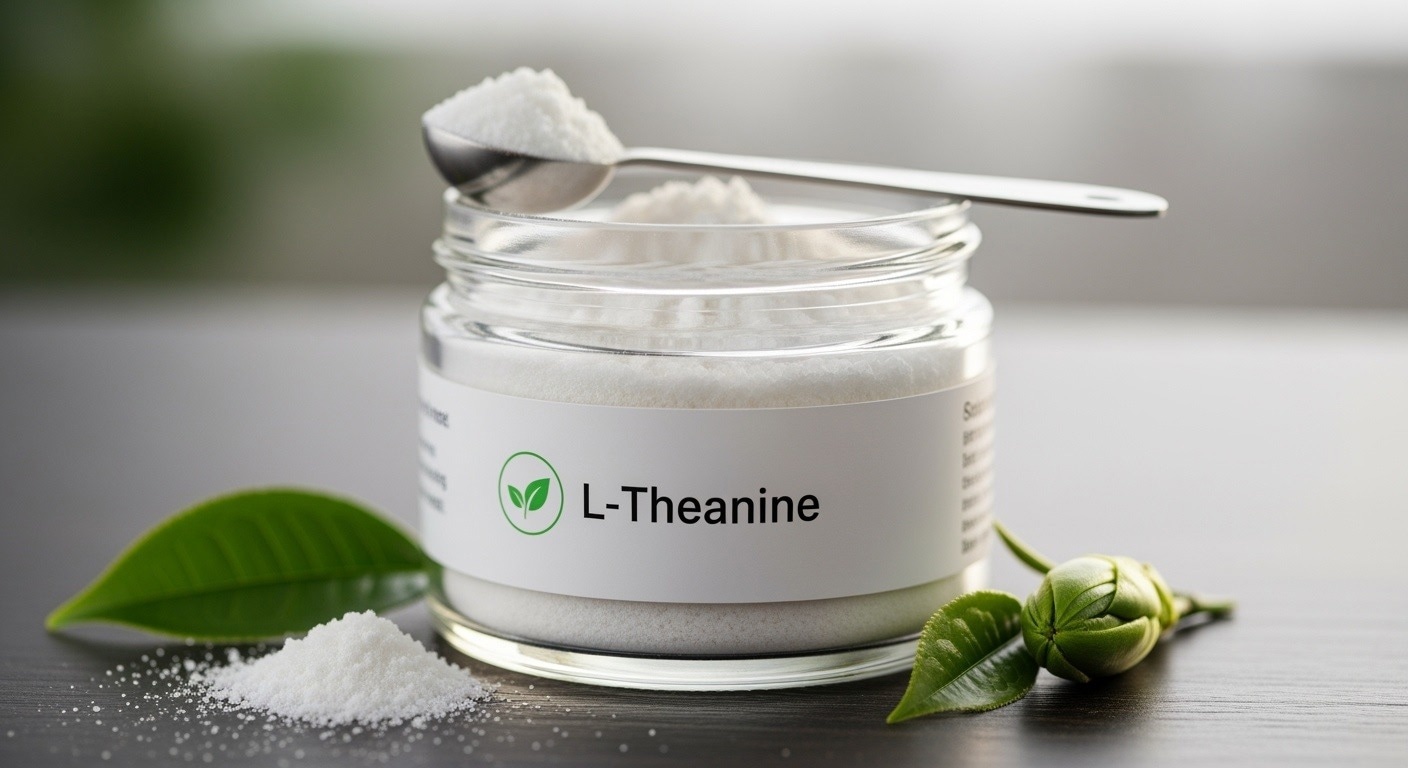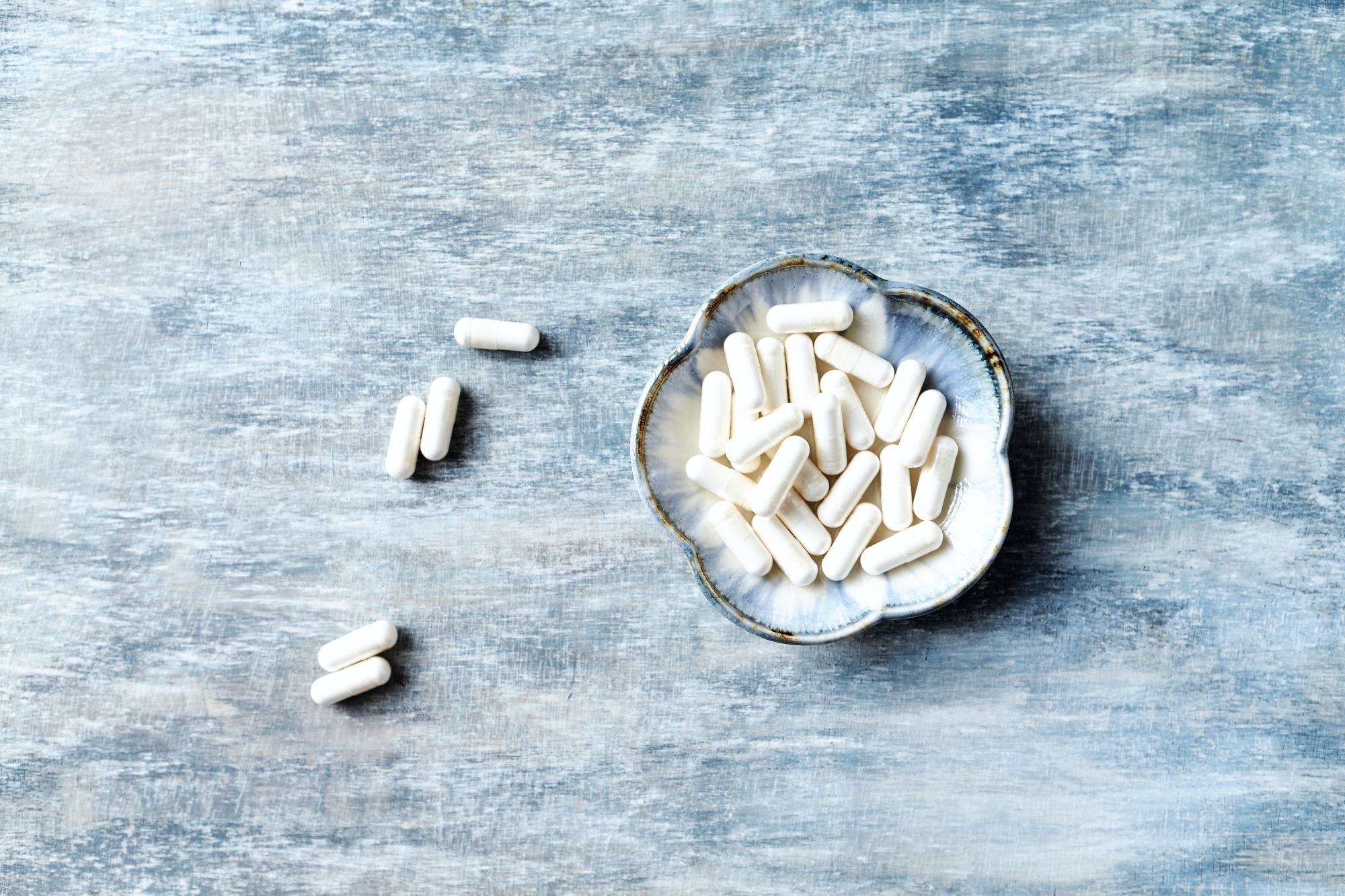Introduction
Pharmacological profile of L-theanine
Preclinical evidence
Clinical evidence
Safety, tolerability, and dosage
Limitations and gaps in current research
Conclusions and future directions
References
Further reading
Can a natural tea compound really ease your mind? This article explores how L-theanine from green tea may offer stress relief and cognitive benefits.
 Image Credit: Shutterstock AI Generator / Shutterstock.com
Image Credit: Shutterstock AI Generator / Shutterstock.com
Introduction
L‑theanine, a non‑protein amino acid predominantly abundant in green‑tea leaves (Camellia sinensis), has been widely studied for its impact on cognition, anxiety, mood, and relaxation. A typical 250 mL cup of green tea provides approximately 8–30 mg L-theanine, whereas most clinical studies use 200 mg or more daily in supplement form.
Pharmacological profile of L-theanine
L‑theanine (γ‑L‑glutamylethylamide) is an amino‑acid analog with an ethylamide backbone that is structurally similar to that of L‑glutamate, γ‑aminobutyric acid (GABA), and L‑glutamine. After oral ingestion, L-theanine crosses the blood-brain barrier (BBB) primarily via sodium-coupled amino acid transporters, reaching the brain within 30–60 minutes, where it persists for approximately five hours before clearance. Bioavailability in humans is estimated to be 47–54% (from capsules or tea) and up to 72–74% when erythrocyte-bound L-theanine is included.
L‑theanine acts as a partial agonist or modulator at glutamate receptors (including NMDA, AMPA, and kainate subtypes) and may interact weakly with GABAergic and glycine pathways. While L-theanine competes with glutamate at some receptors, its direct affinity is low, and in vivo effects may be more significant. Rodent studies have reported that L-theanine increases dopamine release from the striatum, which suggests its role in modulating mood through dopaminergic pathways. However, the effects on serotonin (5-HT) are region- and dose-dependent, and inconsistent; some studies show increases in the hippocampus, while others show decreases in the cortex.
Preclinical evidence
Peripheral or systemic dosing of L-theanine engages brain targets, modulates monoaminergic and glutamatergic signaling, and enhances synaptic plasticity. In behavioral models, L-theanine treatment consistently reduced anxiety‑like responses and avoidance behaviors while also improving exploratory recovery rates following exposure to stress during elevated‑plus‑maze and restraint tests.1,3
Chronic intake of 0.3% L‑theanine in drinking water lowers baseline and stress‑evoked plasma corticosterone levels while simultaneously restoring hippocampal long‑term potentiation suppressed by glucocorticoid overload. Within the hippocampus, L-theanine acts as a partial agonist at glycine sites on N-methyl-D-aspartate receptors, potentially shifting the excitatory balance toward neuroprotection. Some animal models demonstrate increases in dopamine and region-specific increases or decreases in serotonin (5-HT), but confirmatory evidence for robust effects on serotonin in humans is lacking. 1,3
Although these findings are promising, systematic dose‑response and combinatorial studies are needed to translate these preclinical observations into rigorous clinical protocols. Future research should also evaluate sex differences, chronic adolescent exposure, and interactions with high‑fat diets to optimize preventive applications in humans. There is also a need to further study the impact of L-theanine when consumed as part of the food matrix (e.g., tea), as interactions with other tea components may alter absorption and efficacy. 1,3
Clinical evidence
In healthy volunteers, a single 200 mg dose of L-theanine significantly reduces salivary cortisol levels and sympathetic arousal in response to cognitive stress. In another study investigating the same 200 mg dose of L-theanine, parallel reductions in heart rate variability (HRV) indices of sympathetic tone were observed, confirming the physiologic and subjective calming effects of this compound. In fact, L-theanine treatment provided comparable relaxation effects when compared to alprazolam treatment in an anticipatory‑anxiety model. However, the anxiolytic effect of L-theanine is generally milder than that of pharmacological anxiolytics and may be most notable in individuals with higher baseline anxiety.1,3,4
A randomized, placebo-controlled trial in 30 healthy middle‑aged adults reported that four weeks of 200 mg/day of L-theanine reduced anxiety, depressive mood, and sleep‑latency symptoms while improving verbal fluency. Furthermore, no serious adverse events emerged. These findings were especially significant for the "trait" anxiety component and for people with lower baseline cognitive scores, and improvements in sleep latency and daytime dysfunction were also observed.3
Narrative syntheses across multiple studies indicate similar or larger effect sizes in individuals diagnosed with generalized anxiety disorder, major depressive disorder, or schizophrenia with daily doses up to 400 mg for a maximum duration of eight weeks. Repeated oral L‑theanine (200-400 mg) appears safe and modestly lowers anxiety scores, reduces stress biomarkers, and improves cortical α‑rhythms, with these effects particularly significant among individuals with higher baseline anxiety levels. However, some RCTs in patients with clinical anxiety (e.g., GAD) did not find significant differences from placebo for primary anxiety endpoints, but did note improvements in sleep satisfaction.1,3,4
 Image Credit: Eugeniusz Dudzinski / Shutterstock.com
Image Credit: Eugeniusz Dudzinski / Shutterstock.com
Safety, tolerability, and dosage
In a recent triple‑blind crossover study, a single 200 mg dose of AlphaWave® L‑theanine did not cause any product‑related adverse events or clinically significant laboratory changes in adults between the ages of 19 and 60 years, thus confirming good tolerability. Recorded events were rare and considered unrelated or not likely to be related to the treatment.
Eight‑week trials using 400-900 mg/day of L-theanine for the treatment of generalized anxiety disorder or schizophrenia similarly reported no serious adverse events. Comprehensive reviews have similarly confirmed the general safety of L-theanine in humans and animals. LD50 values in rodents are greater than 5,000 mg/kg, indicating very low acute toxicity. The most common side effects in trials were mild and included headaches or gastrointestinal upset, but the rates were similar to those of the placebo.5
Health Canada considers L‑theanine to be a natural health product with a suggested maximum dose of 200-250 mg/day. Comparatively, the United States Food and Drug Administration (FDA) considers a maximum daily intake of up to 1,200 mg/day safe. No cases of serious toxicity or overdose have been reported in the scientific literature.
L-theanine is marketed worldwide as an over-the-counter dietary supplement or natural health product. In Canada, the AlphaWave® product was approved by the Natural and Non‑Prescription Health Products Directorate, with supporting clinical trial data that obtained ethics approval.5
Limitations and gaps in current research
Most L‑theanine anxiety trials are exploratory and associated with numerous limitations, including small sample sizes, short treatment durations, and inconsistent outcome measurements. In the future, large, multicenter randomized controlled trials that recruit well‑characterized clinical anxiety populations, rather than healthy volunteers, are needed. Adequately powered and methodologically consistent studies are essential to determine whether L‑theanine meaningfully benefits people with anxiety disorders. Additionally, heterogeneity in baseline anxiety and cognition among study populations contributes to variable results. Research is also needed on long-term use and interactions with food matrices and other tea constituents.1,6
Conclusions and future directions
Accumulating clinical and preclinical data indicate that L‑theanine can reduce stress and subjective anxiety without causing sedation or serious adverse events, which positions this amino acid as a safe and mild anxiolytic. Integrating L-theanine into current treatment protocols for mild‑to‑moderate anxiety has the potential to complement cognitive behavioral therapy, mindfulness, and low‑dose pharmacotherapy. However, robust evidence from large, long-term, and placebo-controlled trials is still needed before routine clinical recommendations, particularly for clinical anxiety disorders.
References
- Dashwood, R., & Visioli, F. (2025). l-theanine: From tea leaf to trending supplement – does the science match the hype for brain health and relaxation? Nutrition Research. 134. 39-48. DOI: 10.1016/j.nutres.2024.12.008, https://www.sciencedirect.com/science/article/pii/S0271531724001684
- Yamaura, S., Sadamori, K., Konishi, R., Majima, T., Mukai, A., Uno, K., Kinjo, T., Komori, K., Kuramoto, N. and Kawada, K. (2024). Pharmacokinetics of L-theanine and the effect on amino acid composition in mice administered with L-theanine. Amino Acids 56. DOI: 10.1007/s00726-024-03389-3, https://link.springer.com/article/10.1007/s00726-024-03389-3
- Hidese S, Ogawa S, Ota M, Ishida I, Yasukawa Z, Ozeki M, Kunugi H. (2019). Effects of L-Theanine Administration on Stress-Related Symptoms and Cognitive Functions in Healthy Adults: A Randomized Controlled Trial. Nutrients. 11(10). DOI: 10.3390/nu11102362, https://www.mdpi.com/2072-6643/11/10/2362
- Sakamoto, F. L., Ribeiro, R. M. P., Bueno, A. A., & Santos, H. O. (2019). Psychotropic effects of L-theanine and its clinical properties: From the management of anxiety and stress to a potential use in schizophrenia, Pharmacological Research. 147. DOI: 10.1016/j.phrs.2019.104395, https://www.sciencedirect.com/science/article/abs/pii/S1043661819307790
- Evans, M., McDonald, A. C., Xiong, L., Crowley, D. C., & Guthrie, N. (2021). A Randomized, Triple-Blind, Placebo-Controlled, Crossover Study to Investigate the Efficacy of a Single Dose of AlphaWave® l-Theanine on Stress in a Healthy Adult Population. Neurol Ther. 10. 1061–1078. DOI: 10.1007/s40120-021-00284-x, https://link.springer.com/article/10.1007/s40120-021-00284-x
- Moshfeghinia, R., Sanaei, E., Mostafavi, S., Assadian, K., Sanaei, A., & Ayano, G. (2024). The effects of L-theanine supplementation on the outcomes of patients with mental disorders: a systematic review. BMC Psychiatry. 24. DOI: 10.1186/s12888-024-06285-y, https://bmcpsychiatry.biomedcentral.com/articles/10.1186/s12888-024-06285-y
Further Reading
Last Updated: Jul 28, 2025